 Petzlover
Petzlover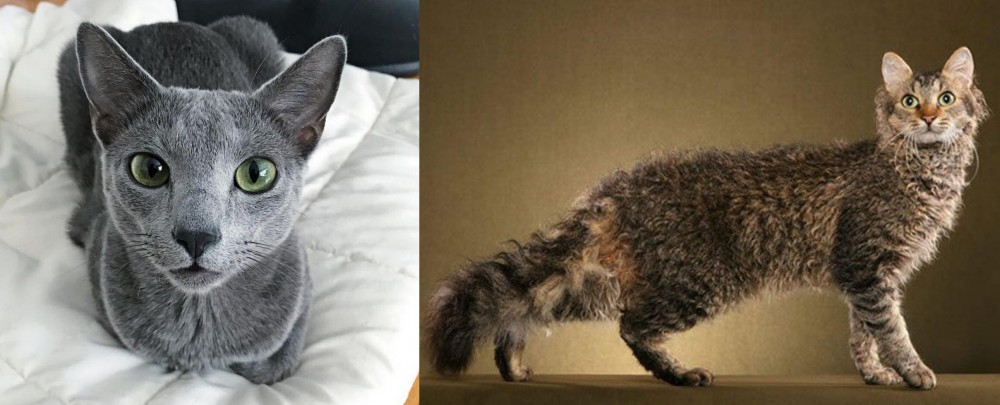 Blue Russian is originated from Russia but LaPerm is originated from United States. Both Blue Russian and LaPerm are having almost same weight. Blue Russian may live 5 years more than LaPerm. Both Blue Russian and LaPerm has same litter size. Both Blue Russian and LaPerm requires Low Maintenance.
Blue Russian is originated from Russia but LaPerm is originated from United States. Both Blue Russian and LaPerm are having almost same weight. Blue Russian may live 5 years more than LaPerm. Both Blue Russian and LaPerm has same litter size. Both Blue Russian and LaPerm requires Low Maintenance.
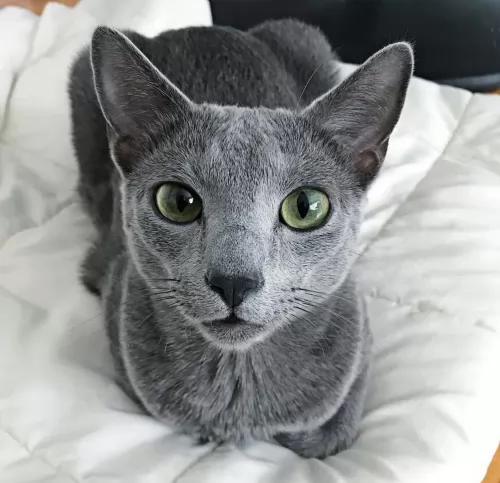 The Blue Russian is a rare cat and not much is known about its origins, but it is believed that the cat comes from northern Russia.
The Blue Russian is a rare cat and not much is known about its origins, but it is believed that the cat comes from northern Russia.
The Cat Fanciers Association believes that the cat descended from cats kept by Russian Czars. Research tells us that there is no mention of the Blue Russian until the 19th century. The Russia Blue made its first public appearance in 1875, being exhibited at London’s Crystal Palace as the ‘Archangel Cat’.
By 1912, the Russia Bue was given its own classification after its introduction to the USA in the early 1900s.
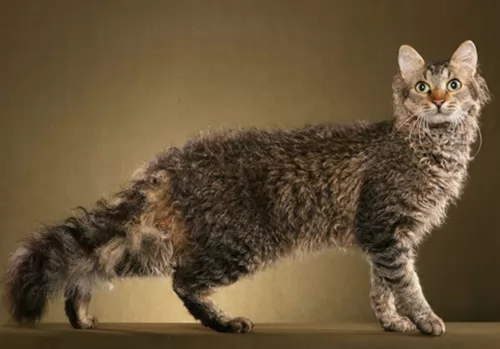 The LaPerm cat hails from the United States of America but you’ll find him in many other countries around the world.
The LaPerm cat hails from the United States of America but you’ll find him in many other countries around the world.
The cat has a dominant gene which results in the unusual curly coat of the cat. This means he is part of the rex breed. This is a term given for the naturally occurring genetic mutation that gives the cat its wavy coat.
It’s not an old cat breed this and it seems to have come about in the early 1980s for the purposes of controlling rodents. The breed founders were Linda and Richard Koehl from Oregon. They started a formal breeding program and the breed was named after their curly coat.
After the cats got the name LaPerm, it was in 2002 that they got recognition from the Cat Fanciers Association.
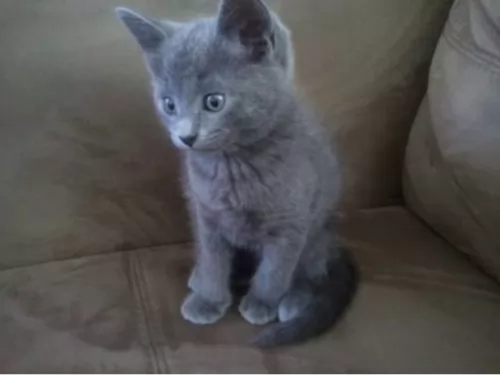 The Russian Blue is a medium-sized cat with a long, finely-boned boy. It is a slender cat, but he appears larger because of his dense double coat.
The Russian Blue is a medium-sized cat with a long, finely-boned boy. It is a slender cat, but he appears larger because of his dense double coat.
He weighs in the region of 3 – 6kg. In spite of the dense and luxurious short silvery coat, the cat doesn’t shed much. The coat can in fact be a silvery shade to a dark slate grey. The eyes are a beautiful green, the ears widely spaced and slightly rounded at the top.
The Russian Blue is a sweet-tempered cat who becomes attached to his human owner and who will even follow his owner much like a dog.
This particular cat breed may be quite shy, but he becomes social around his family members and may even be reluctant to share time with strangers.
He also doesn’t mind spending some time alone if you have to work. Curious and intelligent the Russian Blue is somewhat reserved but he makes a great companion as he is sensitive to his owner's moods.
 The LaPerm is a medium-sized cat that can weigh anything between 3 and 7kg. They’ve got an athletic build. The legs and the neck are fairly long.
The LaPerm is a medium-sized cat that can weigh anything between 3 and 7kg. They’ve got an athletic build. The legs and the neck are fairly long.
It is thought that they are more hypoallergenic than many other cats but no cat is truly hypoallergenic. The coat is the cat's most exceptional feature, with loose curls. The coat can be long or short. All colors and patterns are acceptable, with red, tabby, and tortoiseshell being more common.
There is no undercoat. The eyes of the cat are medium-sized and almond-shaped.
These are affectionate cats with an outgoing personality. He has a sense of humor so becomes an entertaining cat.
He gets on well with children in the home. People who have owned the cat describe him as clownish. He is playful and that means providing him with some interesting toys.
It’s an intelligent cat and learns to use his paws to open doors and tap you to take notice. He is also fairly active and will willingly retrieve small balls. He is gentle, loving, quiet, and affectionate towards his human family.
 Russian blue cats are such intelligent creatures and he will require some mental stimulation because of it.
Russian blue cats are such intelligent creatures and he will require some mental stimulation because of it.
He loves mealtimes, but remember to not overfeed him as this shortens his lifespan.
He is a vocal cat and will tell you when he is hungry or he wants to play.
These cats don’t like too many changes so keep things the same for him.
When you try to keep your lovely Blue Russian happy, you’ll be rewarded by having a fantastic feline companion.
 The LaPerm cat is known for its loyal, loving personality. It’s a cat that thrives on being involved with its human family and can easily turn into a lap-cat.
The LaPerm cat is known for its loyal, loving personality. It’s a cat that thrives on being involved with its human family and can easily turn into a lap-cat.
They’re active and also intelligent, and will love you to play some games with him. He will become quite vocal when he demands your attention.
Provide him with a climbing tree as he is active and loves to climb where he can survey the room and decide which human being’s lap he has in mind.
 La Perms are generally healthy cats. However, any cat owner needs to recognize the signs of some of the common cat illnesses there are.
La Perms are generally healthy cats. However, any cat owner needs to recognize the signs of some of the common cat illnesses there are.
Cancer, feline immunodeficiency virus, diabetes, and heartworm are all diseases that your healthy cat can at some time succumb too.
Keep an eye on your furry friend, and if he is lethargic and no longer his happy self, get him to the vet immediately for a check-up.
 Part of caring for a cat as a responsible pet owner comes from feeding your pet. The Russian Blue is a cat that enjoys his food so you will have to look out for overfeeding.
Part of caring for a cat as a responsible pet owner comes from feeding your pet. The Russian Blue is a cat that enjoys his food so you will have to look out for overfeeding.
A cat that is overweight can start developing joint problems and diabetes. Rather stick to scheduled meals so that you can know exactly what your feline pet is getting. Such a beautiful cat needs the best food there is to keep the coat shiny and healthy and to prevent illness.
Always read the food labels to ensure the best ingredients and the right portion sizes. Make sure your cat gets food that is meat protein-rich as a cat is a carnivore.
Water is another important part of your Blue Russian’s diet. Fresh cool water should be available for your cat night and day. Water bowls are good but a water fountain is a tantalizingly attractive way for your pet to be attracted to drinking more water.
Make sure that you rake up all your cat’s droppings from the litter box every day as the Russian Blue is a hygienic cat and wants a clean litter box. Make sure the litter box is in a nice quiet spot for your cat.
The cat has a dense coat but isn’t a heavy shedder and requires very little grooming.
Ensure a decent bed for your Bombay cat. Any soft cat bedding will do, and while some cats like a simple flat mattress-type bedding arrangement, other cats like the idea of getting into a bed that provides some privacy.
You just have to find yourself a decent pet shop because when you do, you’ll find a host of soft, warm, fully washable blankets and pillows for your pet. Once you’ve decided on the right bed and a nice quiet spot, your cat will have a complex issue sorted out as some cats can be fussy with their sleeping arrangments.
Make sure your cat is neutered or spayed to avoid unwanted kittens. Neutering offers health benefits, reducing the risk of different cancers. Your cat also no longer has the desire to fight over mates and territory.
 The LaPerm’s unusual coat is easy to care for as it isn’t a big shedder. You’d think that the curls would tangle but they don’t. You can gently comb or brush the curls once or twice a week. Just like with a human perm, you can mist the cat’s curls and comb and fluff them out with your fingers.
The LaPerm’s unusual coat is easy to care for as it isn’t a big shedder. You’d think that the curls would tangle but they don’t. You can gently comb or brush the curls once or twice a week. Just like with a human perm, you can mist the cat’s curls and comb and fluff them out with your fingers.
Cats are particularly prone to periodontal disease, so look into your cat’s mouth occasionally to see that the teeth are as they should be. Brushing the teeth can stress a cat out and make it miserable and the dry cat foods help to keep the teeth clean.
Pet groomers and the vet can check out the teeth for you and make sure they are in tip-top condition.
Make sure your cat’s eyes are clear and bright and free of discharge. Trim the nails as required – something the vet or the pet groomers can also do for you.
Provide your LaPerm with a litterbox and keep it spotlessly clean, ridding it regularly of the cat’s droppings.
Even though there are excellent commercial cat foods on the market, some cats develop finicky eating habits. Don’t start feeding your cat human foods and snacks to coax him to eat. It can cause a host of digestive problems.
Cats are carnivores and require foods high in protein to remain healthy. A veterinarian will need to examine your cat if he is refusing to eat and is losing weight.